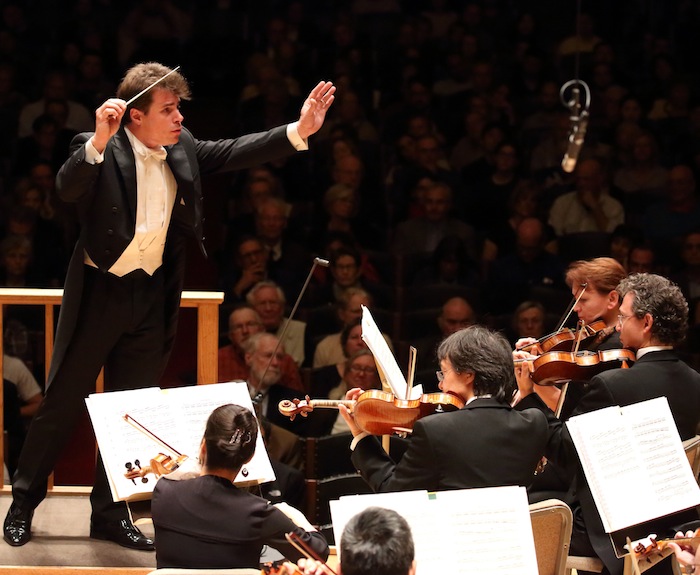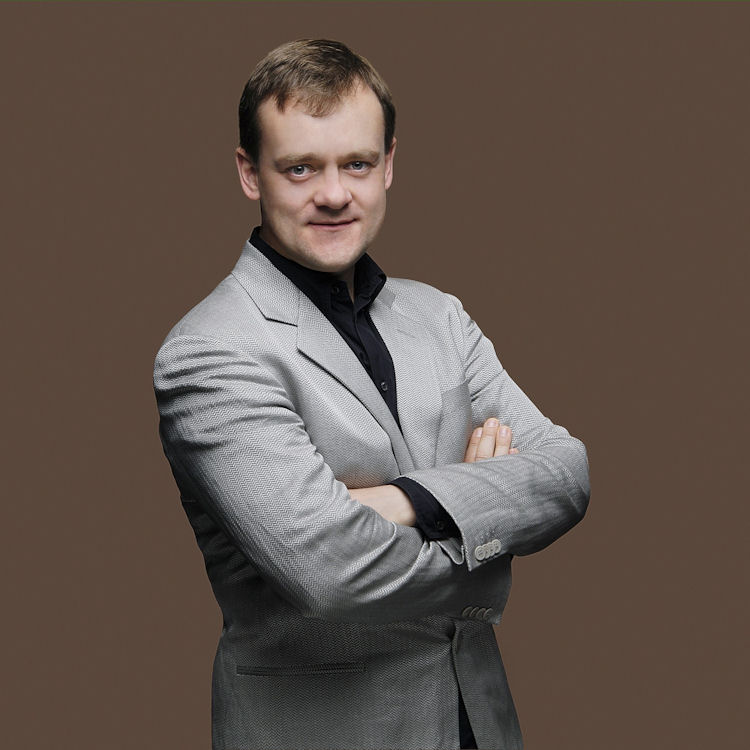Hrůša makes an exciting Boston Symphony debut

Jakub Hrůša made his debut conducting the Boston Symphony Orchestra Thursday night. Photo: HIlary Scott
Certain guest conductors have become favorites among audiences at concerts of the Boston Symphony Orchestra. This month features the return of Charles Dutoit, and Bramwell Tovey and Christoph von Dohnányi will appear with the orchestra later this season.
Yet the revolving door of podium guests frequently brings in fresh faces that are given the chance to make strong, even exciting first impressions. That was the case Thursday night at Symphony Hall, where Jakub Hrůša made his BSO debut.
The 35-year-old Czech conductor has been a name to watch over the past decade. He has served as associate conductor of the Czech Philharmonic and as chief conductor of the Prague Orchestra, a post he held from 2008 to 2015. He is currently the chief conductor of the Bamberg Symphony. This season he will debut with the Mahler Chamber Orchestra, New York Philharmonic, and Chicago Symphony Orchestra, among others.
Czech music is a specialty of Hrůša’s, and he has recorded the works of Smetana and Janáček. Music by the two composers made up half of Thursday’s program, with one piece making its belated BSO debut.
Janáček’s Taras Bulba is a dramatic symphonic rhapsody based upon the historical novel by Nikolai Gogol. Its three movements recount the deaths of Bulba, a ruthless Cossack with hatred of both Jews and Poles, and his two sons, Andri and Ostap.
Rather than a strict narrative, each movement unfolds in non-linear episodes from the novel. We witness Andri’s love for a Polish woman through a keening oboe solo in the first movement. Ostap’s dreadful end at the hands of Poles sounds powerfully in the second, while the third captures Bulba’s fury as he kills Polish men, women, and children in revenge.
Hrůša is an energetic presence on the podium. He conducted with swift, athletic movements and the occasional leaping downbeat. The resulting performance was not only notable for its drama but for its rhythmic drive and precision. The BSO brass punctuated the work’s dotted figures with pinpoint accuracy, and the string statements that open the second movement sounded with stark power. In the final movement, Hrůša built the disparate sections and Polish dances into a sturdy, satisfying climax.
Two additional orchestral works showed the conductor’s keen interpretative powers.
Smetana’s Šárka, which opened the concert, is the third of the composer’s six symphonic poems collectively known as Má Vlast. Šárka is a rich, dramatic score that tells of the ordeals of the eponymous warrior heroine who has also been the subject of operas by Fibich and Janáček.
Hrůša’s reading gave a nod to the details of the score. Quick glances highlighted a brass chord here and there, and his soft waving gestures seemed to caress the solo clarinet line at it wafted in the air. But the conductor focused on the big picture, drawing playing of firm commitment and musicality.
With Mussorgsky’s Night on Bald Mountain, also heard Thursday night, Hrůša led with an eye to the work’s colorful orchestration.
Much like the finale of Berlioz’s Symphonie fantastique, this symphonic poem is a vivid depiction of a witches’ Sabbath. The piece has long been a crowd pleaser in its cleaned up version prepared by Rimsky-Korsakov.
Hrůša’s dramatic reading coaxed playing of bracing energy, and he shaped the music with vigorous shakes, brisk cut-offs, and wide sweeping movements of the arms. The BSO brass delivered a sturdy wall of sound when called upon, and the luminous phrases that conclude the piece seemed to float heavenward.
The solo spotlight of the evening belonged to German violinist Frank Peter Zimmermann, who performed a deft and colorful rendition of Bartók’s Violin Concerto No. 2.
Completed in 1938, the work possesses elements of the folk-flavored melodies and romantic sweeps that characterized the composer’s early music. It’s also punishingly difficult and has tripped up many a violinist who dares to perform it.
Zimmermann is not in that category. Throughout the performance the violinist was in full command of the piece’s sawing and darting passages. His tone, in the process, displayed a variety of colors, from dusky low notes to high phrases laced in silver.
The second movement of the concerto is one of Bartók’s most beautiful passages. There, Zimmermann found the hints of yearning romanticism, unwinding the line with a singing tone that was answered with soft a blanket of sound by the BSO strings. The quicker section moved with a fittingly awkward, impish gate, and the third movement moved with an off-kilter lilt. The violinist’s gnarly runs, there, took on a fiery energy. Hrůša led a sensitive accompaniment that was well balanced and shaded with tasteful rubato to match Zimmermann’s phrasing.
Zimmermann’s blazing encore, Ernst Schliephake’s transcription of Rachmaninoff’s Prelude in G minor, Op. 23, No. 5, put a finishing touch on a thoroughly dramatic performance.
The program will be repeated 1:30 p.m. Friday and 8 p.m. Saturday at Symphony Hall.bso.org; 888-266-1200
Posted in Performances

Posted Oct 15, 2016 at 8:25 am by Jana Moravkova Kiely
My husband and I are regular Boston Symphony attendants. We went to the Friday 1:30 p.m. performance and were both deeply moved. It was one of the best concerts we have heard in years. We felt Jakub Hrůša helped us to listen, by pointing out the instruments that were about to play, in an elegant and lively manner. He was living the music fully, and helped us to do the same.
As a long time teacher, an emeritus professor of Harvard University, my husband felt Hrůša was not only a great conductor, but also a great teacher.
There is a Czech saying, “Co Čech to muzikant”, which could be translated”Every Czech is a musician.” It is good to hear that national talent sustained by great young musicians, like Jakub Hrůša.
Děkuji Vám pane Hrůšo za nás všechny po celém světě.
Posted Oct 15, 2016 at 8:57 am by Martin Quitt
We attended Friday afternoon. Your review is right on target about the conductor and soloist. Hrusa is engaging and made us realize how much we missed with Levine’s minimalist style. The Bartok is difficult and was thrilling in the concert hall.
Posted Oct 16, 2016 at 7:40 pm by Ito
The review is spot on.
I attended the Friday afternoon performance and then also the Saturday evening show. I came to see mainly Frank Peter Zimmermann play as he is my favorite violinist. I’ve watched a lot of violinists such as J. Bell, Vengerov who I recently saw at Edinburgh, Hahn, Mutter, Perlman, Zukerman, even Isaac Stern’s last two performance among a couple of violinists but my heart always seem to prefer Zimmerman’s sound. His vibrato is so assured, his playing confident, precise in a German sense, yet also carefree and relaxed.
I chatted with him for a very short time after the Saturday performance mainly to get his autograph and I was very surprised when he said that he was not playing with his Lady Inchiquin strad. The sound was indeed a little bit muted and I noticed how they had to install a microphone on the stage for him. Nonetheless, everything was great. I look forward to watching him in Berlin with Kirill Petrenko in December!
Cheers,
A big fan and bewunderer
Posted Oct 16, 2016 at 7:43 pm by Ito
Does anyone know why he was not playing the Lady Inchiquin strad? I thought the Westphalia government had already acquired the violin back for him?
What violin was he using at the concert. I noticed that it had a one piece back, which the Lady Inchiquin has.
Cheers,
Posted Oct 18, 2016 at 1:31 pm by nimitta
Fascinating comment, IIto. About the mics positioned before Herr Zimmermann’s music stand: they looked to me like the dedicated recording mics the BSO typically uses for string soloists, and not for amplification. I don’t recall seeing either the sound engineer’s panel or the hanging speakers in the hall, either, as they should have been were any part of the program amplified.
Posted Oct 19, 2016 at 4:52 pm by Ito
Thanks for the comment Nimitta. You are most probably correct–that the mic was not for amplification but for recording.
I’m almost sure he was playing with the General Dupont’, ‘Grumiaux’ Stradivarius. I deliberately sat at the front seat to observe the violin and it was a one piece back with distinctive marks of the General Dupont. It was definitely not the Lady Inchiquin. I also reread the article saying that Zimmermann would regain access to his Lady Inchiquin through the help of the North Rhine-Westphalia government (http://www.thestrad.com/frank-peter-zimmermann-regains-access-to-lady-inchiquin-stradivarius-violin/) but it doesn’t confirm that they have already acquired it. I guess the violin has not been delivered yet to Herr Zimmermann. I hope he gets it before the performance in Berlin.